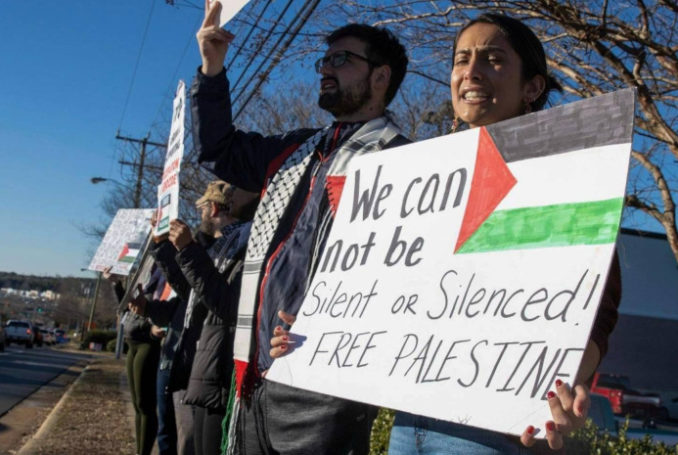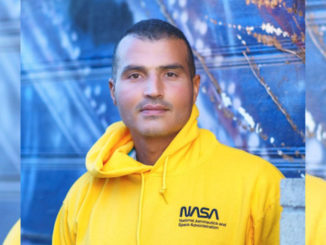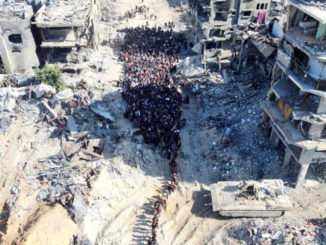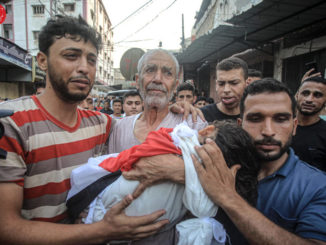
February 3, 2024: Dozens of demonstrators protest in Winston-Salem, NC, USA, calling for an end to Israel's genocide in Gaza and for an immediate ceasefire. Demonstrations have spread around the world in reaction to Israel's heavy bombardment in Gaza, which has killed over 27,000 Palestinians and wounded another 66,000, with thousands unaccounted for, presumed dead. Photo: Sharona Weiss/ Activestills
Par Samah Jabr
To the courageous protesters, I offer these words of praise and encouragement:
Know that the people of Palestine look to you, read your banners, and hear your chants! Moved by your solidarity, we find solace and strength in your support. Your actions help regenerate our wounded links of common humanity—bonds that have been injured by hegemonic regimes perpetuating injustice on earth.
As a Palestinian psychiatrist witnessing the recent surge of student activism in universities throughout the United States in solidarity with Palestine and also observing the local Palestinian reaction to it, I am struck by the profound therapeutic potential inherent in such movements. At a time when the Palestinian people continue to endure the brutal realities of occupation, apartheid, and violence inflicted by the Israeli state, the unwavering support from young activists across the globe serves as a breath of life, relieving our strangulation under unprecedented Israeli oppression.
The censorship of criticism against Zionism and the Israeli state under the guise of safety and security within American universities is a troubling manifestation of the systemic silencing of pro-justice, pro-Palestinian voices. In the face of this repression, the courageous actions of Columbia students who erected tents on campus and demanded divestment from companies that profit from Israeli activities are acts of bold defiance. Despite facing arrest and crackdowns from university administrators, their resilience has ignited similar protests nationwide and internationally, where governments align themselves with Israeli policies.
In this context, the solidarity extended by university students in the USA to Palestinians is not merely a political stance but a moral imperative. It is a remarkable rejection of the historical complicity of the U.S. government and media in their support of the Israeli occupation and its violence against the Palestinian people. The naivety, passivity, apathy, and numbness of ordinary citizens have long contributed to our national tragedy in equal measure as the evil and wickedness of the leadership of colonial regimes. But by standing in solidarity with Palestinians, these students challenge the narrative of oppression and offering a counter-narrative of empathy, justice, and humanity.
These university students and youth generally, through their energy, idealism, empathy, and thirst for justice, have the potential to serve as the moral compass of any nation. Their activism for Palestine reflects a commitment to universal values of human rights, dignity, and equality. Moreover, their willingness to challenge entrenched power structures demonstrates a profound understanding of the interconnectedness of global struggles against injustice.
The therapeutic effects of international solidarity for Palestinians cannot be overstated. For a people who have endured decades of displacement, dispossession, and violence, the knowledge that they are not alone in their struggle brings solace and empowerment. It reaffirms our humanity in the face of dehumanization and offers a glimmer of hope for a future free from oppression.
As a psychiatrist, I believe in the healing power of solidarity. Its blessings are reciprocal, enriching both those who give and those who receive. By standing together with Palestinians, university students and activists not only advocate for justice but also engage in collective recovery from the guilt and helplessness of vicarious trauma. Their actions embody the principles of empathy, compassion, and acknowledgement that are essential for the creation of a more just and peaceful world. It is my hope that their solidarity will continue to grow, transcending borders and barriers, until the day when Palestine is free and justice is achieved for all.
Here the French version.
Samah Jabr MD, Head of Mental Health Unit, MoH
Psychiatrist and Psychotherapist
Assistant Clinical Professor, George Washington
https://linktr.ee/samahjabr



